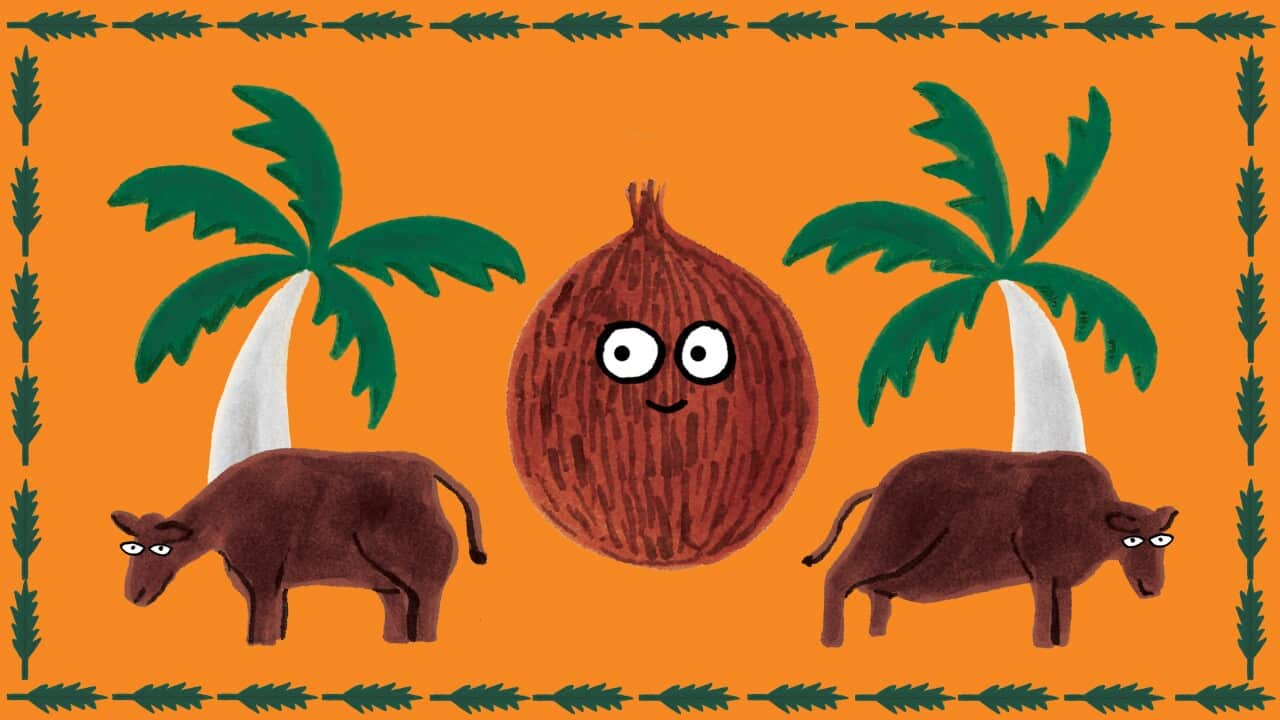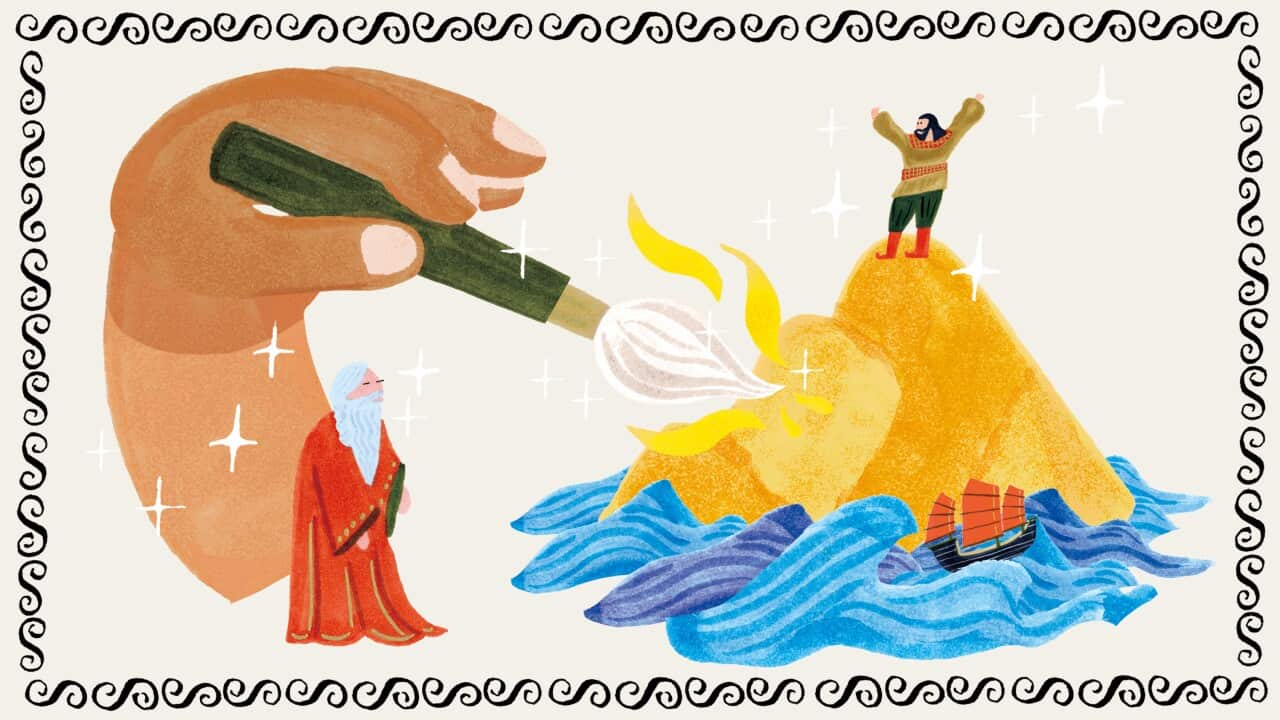This story comes to us from Vietnam. It follows the life of Sọ Dừa as he grows from a child into a man of great character, despite his unusual appearance. It's also about a very powerful gift... one that we all have, if only we'd realise it.
Host and narrator: Alice Qin
Story consultants: Linh Le, Chi Nguyen
Story editor: Marcel Dorney
Translation: Oliva Nguyen, Chi Nguyen
Voices: Chi Nguyen
Recording engineer: Vlad Ladgman
Executive producer, sound design and music: Kieran Ruffles
For more Story Globe episodes, follow the podcast in Apple Podcasts, Spotify, or the SBS Audio app.
Transcript
Once upon a time, there was a small village by a great forest. At the edge of the forest lived two people, a man and a woman, who had married young. For many years, they had worked hard, farming and collecting from the forest. But because they did not own their house nor their land, another man, called the landlord, took a great deal of what they earned and the man and the woman stayed poor.
Nevertheless, they were happy, for they loved each other very much, though, even after many years, they had no children of their own.
One very, very hot day, the woman was in the forest, collecting firewood. She had run out of water, and was so thirsty that she feared she might have to go home early, when under a tree, she saw it. A coconut shell, glistening half full with rainwater.
Although she would have told anyone else - 'That water isn’t safe to drink!' - it was the hottest day of the year, and the woman couldn’t help - just taking - one sip from the coconut shell. Just to help her keep working, she said to herself.
The very next week, she found that she was pregnant.
Her and her husband were very happy, and prepared their little house carefully for their new baby.
Imagine the woman’s surprise, then, when - after giving birth, which is never an easy thing to do - she held her child in her arms for the first time. She wanted to say that he was beautiful - and, of course, he was - but it was also true that her baby was a coconut. A smooth, perfectly round coconut, with a handsome pair of eyes blinking up at her.
The woman looked at her husband’s face, and saw that although he loved them both very much, he was afraid. They had hoped for so long, and this was just so unexpected.
‘My love,’ said the new mother, ‘I think we should name him Sọ Dừa.’
‘All right,’ said the new father. ‘Coconut Shell it is.’ For that is what Sọ Dừa’s new name means.
Sọ Dừa grew up quickly. He was a very well-behaved child, who clearly loved his parents very much. But his mother and father had no expectations that their son, being a coconut, would be able to help them with their work.
One day they went to tend the cows that belonged to the landlord, bringing Sọ Dừa with them. Blinking his expressive eyes, Sọ Dừa let his mother know that he’d like her to put him on the ground, please. When she did so, however, she was astonished.
Her son began to roll. Slowly at first, but with wonderful control over his movements. Soon, he was rolling across the field, faster than a grown man could run. His parents shouted with fear: 'Watch out, Sọ Dừa, be careful of the cows!'
But imagine their surprise when they realised - as their son dashed between the cows like a little ball of lightning… he was also bringing them together, into a group, as if for their safety.
‘Well,’ said the husband to his wife, after they had both spent a minute getting over their surprise, ‘why shouldn’t he be a herdsman? After all, he’s our son.’
In time, Sọ Dừa had proved himself the most capable herdsman in the district. One spring, the landlord, who liked to encourage hard work in others, instructed his eldest daughter, who was the same age as Sọ Dừa, to bring the young herdsman some lunch, as a reward for his efforts. But when his eldest daughter returned, she was furious.
‘Why are you angry?’ asked the landlord’s second daughter.
‘Oh, you’ll see,’ sneered the eldest, and went to declare to her father that she would not be delivering any more food to a coconut.
‘He’s an employee’, said her father, ‘like any other!’
‘That’s obviously not true!’, said the arrogant young lady. ‘And I won’t pretend it is, even if you will!’
The landlord, sighing, turned to her sister, and said ‘My daughter, tomorrow you will -’
‘Father,’ said his second daughter, ‘please, in our mother’s memory, don’t humiliate me as well. I am also rich and beautiful, and I can’t be seen delivering food to someone like that!’
Just when the landlord was about to explode with fury, his youngest daughter, who had heard everything, spoke up.
‘Father,’ she said, ‘I would be happy to take this herdsman some lunch.’
Her sisters laughed cruelly, but the young woman looked steadily at her father.
‘Please yourself,’ said the landlord. ‘Tomorrow’.
So the next day, the landlord’s youngest daughter brought lunch to Sọ Dừa. And the next. And the next. Although h they did not speak at first, she grew more and more impressed with his skill and dedication. Coconut or otherwise, Sọ Dừa really was an excellent herdsman.
Soon, she began bringing her own lunch, and eating it alongside him in the shade. Sometimes she would tell him stories before he had to begin work again. When the landlord’s workers took a holiday, she found that she missed bringing lunch to Sọ Dừa, and decided - ignoring the mean giggles of her sisters - to bring it to his parents’ little house on the edge of the forest.
It took longer to get there than she had thought; and by the time she approached the small hut where Sọ Dừa lived with his parents, the sun was low in the sky. So at first, when she saw the handsome young man sitting on top of a fence post, she thought that the afternoon sun had blinded her.
Then she rubbed her eyes, and looked again.
Yes, there was no doubt about it. On top of the fence post sat Sọ Dừa, round and smooth, resting after a hard day’s work. And yet she had seen the beautiful young man so clearly, her breath still caught in her throat.
‘Sọ Dừa’ she managed to call out, and as he turned to greet her, she was certain. Her eyes, like her sisters’ eyes, could be easily deceived. But just now, she had seen Sọ Dừa with her heart.
As the two young people made their way down the short path to the little house, Sọ Dừa’s mother came out to greet them.
‘I am sorry,’ she began, all in a rush, and was about to explain that they were not expecting visitors and her son was very irresponsible for not notifying her, when she caught sight of this young woman’s face, and stopped.
A moment went by in silence, as the mother took in the expression on that face. Then she looked at her son, who responded with a slight but very precise wiggle, as if to say ‘Yes, I know, isn’t she wonderful?’
‘Oh, my dear,’ said Sọ Dừa’s mother to the landlord’s daughter, ‘I think you may see my son…. the way that I do.’
The young woman nodded.
‘He asked me to marry him’, she said quietly, ‘and I have accepted.’
Now, it would be very nice to say that everything went easily after that. But the landlord and his two other daughters were vain and arrogant, and made life very difficult for Sọ Dừa and his family.
When his mother went to ask permission for the marriage, the landlord - with his daughters snickering all the while - demanded that this poor couple, who had worked for him all their lives, provide rich gifts - ten bolts of silk, ten fat pigs, ten barrels of rice wine - in exchange for his daughter’s hand. Upon hearing this, the old woman despaired for her son’s happiness; but upon returning, Sọ Dừa reassured her, skipping determinedly across the yard, that he would take care of everything.
Sure enough, the next morning, all the landlord’s demands were piled up by the front door of the little house, along with two strong men to carry them.
His mother was amazed. For years, she had gradually accepted that her son was an unusual person, who would have an unusual life. But these gifts of silk and wine and livestock seemed to have come out of nowhere. The landlord's youngest daughter however took her hand and said 'I am very sorry that my father has demanded these things. But I want to thank you so much for your gifts.'
'Oh my dear,' Sọ Dừa's mother murmured, 'I had nothing to do with these fine things being here.' 'You have given far more,' said the daughter-in-law, 'without which I'm sure there would be no such miracles.' She went to bow deeply, but the mother-in-law embraced her instead, weeping.
There are many stories about their wedding day, and the happy life they led afterwards. Some say that Sọ Dừa returned to his true form. But no-one seems quite sure what that is. Others insist that Sọ Dừa was always himself, and others simply learned his true nature.
One thing is certain; being rich and powerful makes it harder, and not easier, to see real beauty. Being poor is certainly difficult, but the poor know well the power of kindness; and without kindness, beauty means very little.


